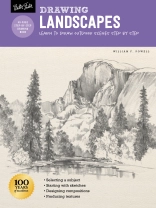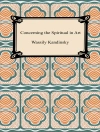With Drawing: Landscapes, learn to render a variety of beautiful landscape subjects in graphite pencil.
William F. Powell invites you into his artistic world to explore a number of basic
drawing techniques and shows how to develop a drawing to its fullest through a series of step-by-step demonstrations. In this 10.25 × 13.75–inch book, Powell explains a number of drawing techniques and special effects and gives tips on how to design a
well-balanced composition .
Landscapes provides you with the necessary knowledge to create your own landscape drawings
from preliminary sketch to the completed work . Discover different methods of shading, ways of manipulating
drawing tools to produce specific textures, and a wealth of beautiful landscapes to both copy and admire, includes scenes from American national parks.
Also included are simple techniques for developing common landscape elements—such as
trees ,
clouds ,
rocks , and
water —and how to apply a variety of methods to
convey a sense of realism . Then, with a little practice, you will be able to apply your newfound skills and draw your own beautiful landscape masterpieces!
Designed for beginners, the
How to Draw & Paint series offers
easy-to-follow guides that introduce artists to basic tools and materials and include simple step-by-step lessons for a variety of projects suitable for the aspiring artist.
Drawing: Landscapes allows artists to develop drawing skills by demonstrating how to
start with basic shapes and use pencil and shading techniques to create varied textures, values, and details for a realistic, completed landscape drawing.
عن المؤلف
William F. Powell was an internationally recognized artist and one of America’s foremost colorists. A native of Huntington, West Virginia, Bill studied at the Art Student’s Career School in New York; Harrow Technical College in Harrow, England; and the Louvre Free School of Art in Paris, France. He was professionally involved in fine art, commercial art, and technical illustrations for more than 45 years. His experience as an art instructor included oil, watercolor, acrylic, colored pencil, and pastel—with subjects ranging from landscapes to portraits and wildlife. He also authored a number of art instruction books, including several popular Walter Foster titles. As a renowned master of color, Bill conducted numerous ‘Color Mixing and Theory’ workshops throughout the U.S. His expertise in color theory also led him to author and illustrate several articles and an educational series of 11 articles entitled ‘Color in Perspective’ for a national art magazine. Additionally, he performed as an art consultant for national space programs and for several artist’s paint manufacturers. Bill’s work included the creation of background sets for films, model making, animated cartoons and films for computer mockup programs. He produced instructional painting, color mixing, and drawing art videos.












